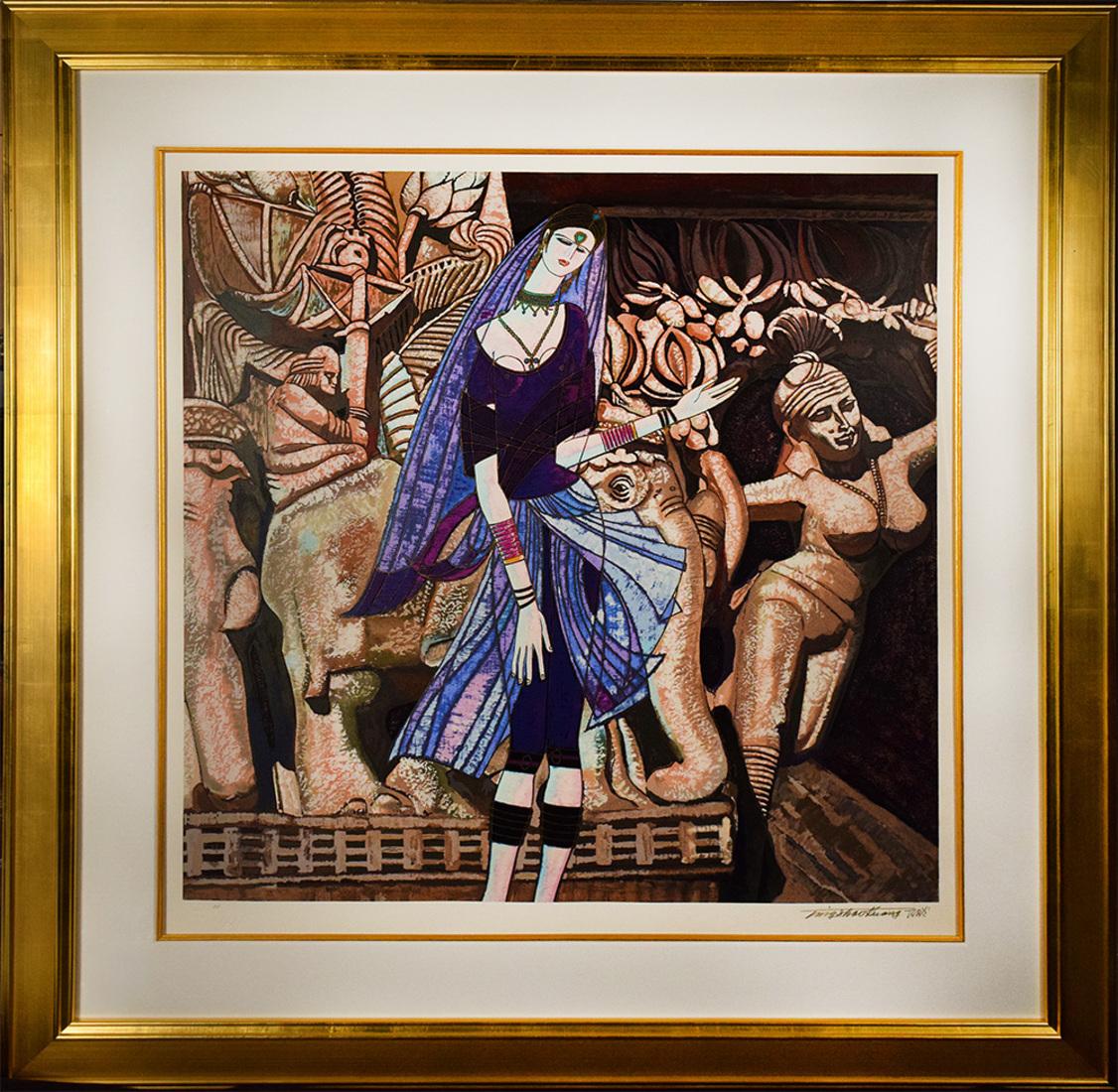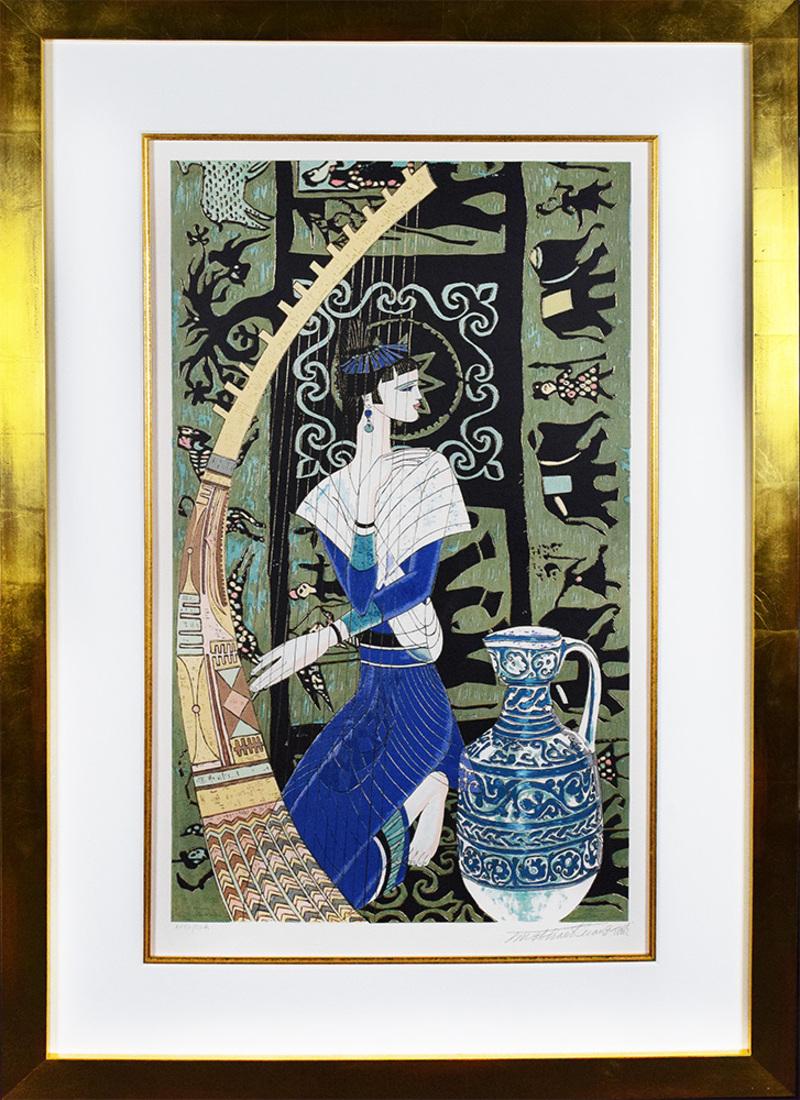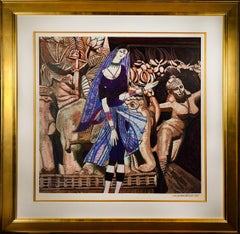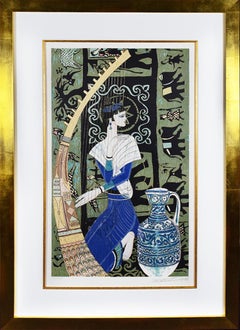Want more images or videos?
Request additional images or videos from the seller
1 of 10
Ting Shao KuangRamayana1995
1995
$750
£581.40
€658.09
CA$1,073.41
A$1,171.33
CHF 607.99
MX$14,013.96
NOK 7,717.32
SEK 7,228.71
DKK 4,915.74
About the Item
This artwork titled "Ramayana" 1995, is an original color serigraph on wove paper by noted Chinese artist Ting Shao Kuang, b.1939. It is unsigned as issue. There is a hand signed and numbered edition of the same image. The artwork (image) size is 26 x 26 inches, the sheet is 31.5 x 32 inches. This artwork is a trial (test) proof. The printer will print the same subject in different colors combination for the artist to select the one he want for producing the final signed and numbered edition. Some of these trial proof are unique as only one copy was printed with these particular colors. You can see on the right margin all the colors that where selected by the printer and artist to create this artwork. It is in excellent condition.
About the artist:
Ting Shao Kuang, a prominent contemporary Chinese painter in America, has produced works characterized by a combination of traditional Chinese painting techniques and the more expressive Western art forms. He has created a unique style that does not belong exclusively to the East or the West, but to the world.
Ting Shao Kuang was born in Chenggu, a village located in the Northern province of Shanxi, China in 1939. The year Ting was born, this area, which once was the center of an advanced civilization, was reeling from the ravages of the Sino-Japanese war. But as the war progressed, Ting's father, a Kuomintang official in Beijing, helped rally the Nationalist forces, and the Japanese Imperial Army was eventually defeated. Mao Zedong's People's Liberation Army took over the government of China only two years after the war, forcing Ting's parents to flee to Taiwan. They left Ting in Beijing with his grandparents who were suffering immensely from the poverty that was inflicted upon them by the Government.
In order to survive his loneliness and alienation, Ting turned to painting for solace. By age 11, he was painting every day, using cooking oil as a medium for his pigment. Despite his lack of adequate supplies, he evidenced such remarkable talent that, in 1954, he was given the opportunity to attend the prestigious high school affiliated with the Central Academy of Fine Arts in Beijing.
In 1957, Ting was accepted at Beijing's Central Academy of Arts and Crafts. Although he was taught "Socialist Realism" in his classes, it was during this time that he discovered the works of Picasso, Matisse and Modigliani. The paintings of these artists inspired him to experiment with new themes and techniques. The summer before he began his senior year, Ting went to the Yellow River to paint the birthplace ofChinese civilization. However, when he arrived he found such misery and poverty, due to the disastrous Great Leap Forward, that he returned to Beijing. Because of the impact his trip had on him, he committed himself to painting only the beautiful side of life.
After graduating in 1962 with highest honors, Ting was signed to teach at the Yunnan Art Institute in Kunming. Here he painted during the night in an abstract style that was considered unacceptable by the government. This forced him to burn his paintings each morning to avoid being caught by the authorities. Although the people in Kunming had more freedom than Ting had ever known, his modernistic views still managed to come to the attention of the authorities. As a result, in 1967, he was suspended from his job and, when rumors of his impending imprisonment reached Kunming, he escaped into northern China. He found sanctuary in the Buddhist monasteries of Gansu where he studied the ancient sculptures they contained. Later he went to Dunhuang , an ancient caravan stop of the Silk Route from 4th to the 13th century, where he studied the paintings preserved on the walls and ceilings of over four hundred caves.
In 1968, Ting felt it was safe to return to Kunming even though it was mandatory to attend political meetings and it was still impossible for him to teach. By that time, however, there were four other artists there who shared his artistic views. After Mao died in 1976 and art classes finally resumed, the friendship that began in secret slowly began to surface. In 1979, these artists formed the Yunnan Shen She Art Association and, three years later, they exhibited at the First International Art Show in Hong Kong. In the same year, Ting was commissioned to paint a mural in the Great Hall of the People, which was an extraordinary honor for any artist, especially one who was considered to be an outsider, philosophically.
Living in the United States since 1980, Ting Shao Kuang has had more than one hundred personal exhibitions in America, Japan, Canada, Greece, Hong Kong and Taiwan, and has become a force in the international art world. Ting's purposeful marriage of ancient art customs, masterful brush strokes, and calligraphic lines, mixed with the starkness and beauty of modernism, have made his works some of the most recognizable in the world. He is considered a world-renowned leader of the Yunnan School by the American art critic Douglas Finly. Japanese art critic Murobushi thinks him an exceptionally authentic Chinese artist, and French art critic Andre Parinaud once commented that "His art has a timeless exuberance, and its exultation of love has turned him into a 20th century Giotto"
- Creator:Ting Shao Kuang (1933, Chinese)
- Creation Year:1995
- Dimensions:Height: 31.5 in (80.01 cm)Width: 32 in (81.28 cm)Depth: 0.01 in (0.26 mm)
- Medium:
- Movement & Style:
- Period:
- Condition:
- Gallery Location:San Francisco, CA
- Reference Number:Seller: tin/sha/kua/071stDibs: LU666314020472
Ting Shao Kuang was born in 1939, in Chenggu, a small village located in the Northern province of Shanxi, China. His earliest childhood was marked by the horrors of the Sino-Japanese war that destroyed his land and left him abandoned after the evacuation of his parents to Taiwan. He found his consolation and escape in painting and by the age of 11, he painted on a daily basis, using the cooking oil as a medium for the pigment. Even besides his limited supplies, Ting Shao Kuang managed to use his extraordinary talent and got the opportunity to attend a prestigious high school which was connected with the Beijing’s Central Academy of Arts and Crafts where he later gained his further education. His painting lessons were based on rules of Social Realism without freedom of expression and with the strict prohibition of any foreign influences. After graduation in 1962, Kuang obtained a position to teach at the Yunnan Art Institute in Kunming. Painting the unacceptable abstract paintings during the night, he would destroy every piece of them in the morning, fearing of the arrestment of the authorities of the country. Still, Ting Shao Kuang’s progressive and modern vision did not fail to attract the attention and he was suspended from his work and escaped to northern China, finding the refuge in Buddhist monasteries in Gansu where he studied ancient sculpture and cave paintings on the old Silk Route which had been preserved for centuries.
Using the distinctive technique, Ting Shao Kuang’s work combines traditional Chinese influences with the Western art forms. Always turning to the female characters as his favorite subjects, their sophisticated shapes have been created from the artist’s deepest feelings and literature that inspired him. After the death of Mao, Kuang and his colleagues founded the famous Yunnan Shen She Art Association and the artist got his first big commission to paint a mural in the Great Hall of the People. Although the achieved the success and recognition in his country, Ting Shao Kuang decided to try the luck in the United States. Living in the Los Angeles since 1980, his work has been exhibited in numerous shows worldwide.
About the Seller
5.0
Platinum Seller
Premium sellers with a 4.7+ rating and 24-hour response times
Established in 1999
1stDibs seller since 2017
856 sales on 1stDibs
Typical response time: 1 hour
- ShippingRetrieving quote...Shipping from: San Francisco, CA
- Return Policy
More From This Seller
View AllAncient Civilization
Located in San Francisco, CA
This artwork titled "Ancient Civilization" 1996, is an original color serigraph on thin rice paper taped to a sheet of wove paper for stabilization by noted ...
Category
Late 20th Century Modern Figurative Prints
Materials
Screen
Religion and Peace
Located in San Francisco, CA
This artwork titled "Religion and Peace" 1995, is an original color serigraph on thin rice paper taped to a sheet of wove paper for stabilization by noted Ch...
Category
Late 20th Century Modern Figurative Prints
Materials
Screen
Moonlight
Located in San Francisco, CA
This artwork titled "Moonlight" 1994, is an original color serigraph on wove paper by noted Chinese artist Ting Shao Kuang, b.1939. It is unsigned as issue....
Category
Late 20th Century Modern Figurative Prints
Materials
Screen
Bali Princess (variant red)
Located in San Francisco, CA
This artwork titled "Bali Princess" variant red, 1996, is an original color serigraph on thin rice paper taped to a sheet of wove paper for stabilization by ...
Category
Late 20th Century Modern Figurative Prints
Materials
Screen
Shavuoth
By David Sharir
Located in San Francisco, CA
This artwork titled "Shavuoth" from the suite "The Seven Festivals" 1981, is an original colors serigraph on Arches paper by noted Israeli artist David Sharir,b. 1938. It is hand sig...
Category
Late 20th Century Modern Figurative Prints
Materials
Screen
Bali Princess (variant blue)
Located in San Francisco, CA
This artwork titled "Bali Princess" variant blue, 1996, is an original color serigraph on thin rice paper taped to a sheet of wove paper for stabilization by noted Chinese artist Ting Shao Kuang...
Category
Late 20th Century Modern Figurative Prints
Materials
Screen
You May Also Like
Ting Shao Kuang "Golden Age of India"
Located in Los Angeles, CA
Ting Shao Kuang (1939, Chengdu, China)
"Golden Age of India"
From the limited edition serigraph. Signed by the artist on the lower right cor...
Category
21st Century and Contemporary Figurative Prints
Materials
Screen
Ting Shao Kuang "Harp"
Located in Los Angeles, CA
Ting Shao Kuang (1939, Chengdu, China)
“Harp”
Serigraph, 1999
Image size is 31” height by 18” wide (78.74 cm x 45.72 cm).
Signed on the lower right corn...
Category
1990s Contemporary Figurative Prints
Materials
Color
Ting Shao Kuang "Harp"
Located in Los Angeles, CA
Ting Shao Kuang (b. 1939)
Harp
1999
color screen print, signed on the lower right side and numbered AP40/50A on the left in pencil, ...
Category
1990s Abstract Expressionist Figurative Prints
Materials
Color, Screen
Preecha Thaothong Signed Limited Edition Lithograph
Located in Houston, TX
Artwork Details:
Preecha Thaothong
1998
Signed Limited Edition Lithograph
Edition 56/100
19 x 23 Inches
Category
1990s Figurative Prints
Materials
Lithograph
Ting Shao Kuang "Peace & Friendship"
Located in Los Angeles, CA
Ting Shao Kuang (b. 1939)
"Peace & Friendship"
1999
color screen print, signed on the lower right side and numbered AP41/50A on the left...
Category
1990s Abstract Expressionist Figurative Prints
Materials
Color, Screen
'Serenade'
By Vu Cuong
Located in Rye, NY
Vu Coung figurative contemporary paintings are painted with bright colors using lacquer on wood. His piece, "Serenade" has dimensions of 40" x 40".
Category
Early 2000s Contemporary Figurative Paintings
Materials
Wood, Lacquer
$3,000
More Ways To Browse
Takashi Murakami Korin
Tama Janowitz
Tete Homme Picasso
The Avengers
Triple Self Portrait
Vitraux Pour Jerusalem
Walasse Ting Geisha
Wayland Moore
Whitney Poster
Yoshitoshi Taiso
1930s Woodblock
Ai Weiwei Tree
Alice And Wonderland Salvador Dali
Andre Heller
Andy Warhol Invitation
Angel Zarraga
Antique Boat Motors
Antique Mermaid Print




